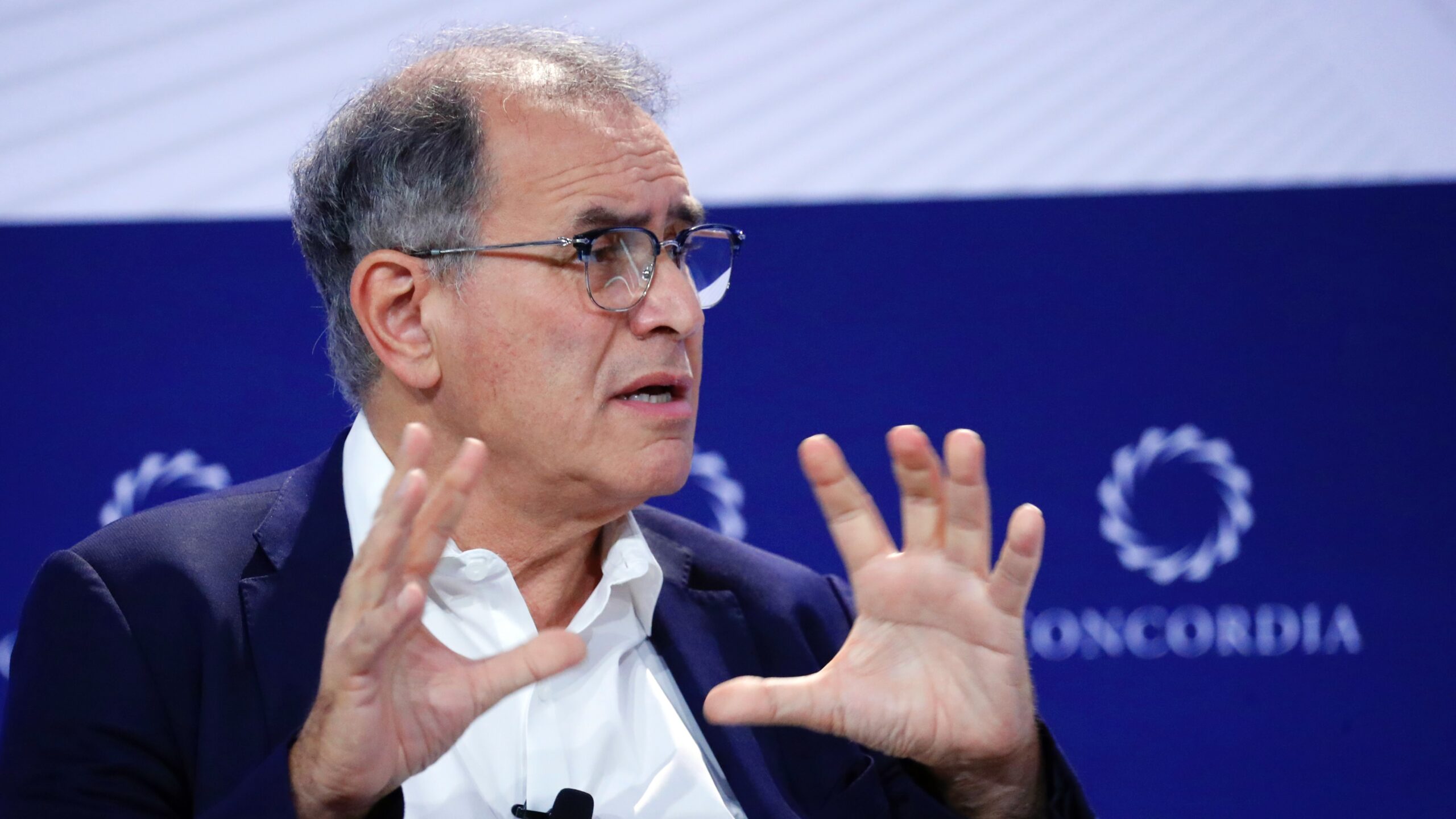Why ‘Dr Doom’ isn’t so gloomy on The Donald

Dr Nouriel Roubini isn't so bearish on the Trump effect. Pic via Getty Images
Nouriel Roubini is known as “Dr Doom” for his perennial bearishness on the global economy, but when it comes to the US, he is reasonably confident that Donald Trump will decide to moderate his policies around the time of his inauguration on January 20.
That could have positive implications for the US economy that may allow the expansion to continue.
If Trump does dial back his trade and immigration policy goals, Roubini thinks the US will have less inflation and continued economic growth, potentially avoiding a damaging bout of stagflation.
It comes as global markets rush to prepare for Trump policies. While the US President-elect appears set on lowering the US corporate tax rate from 21 to 15 per cent, he may decide not to add so much stimulus that it causes inflation and a debt blowout.
That would run the risk of the bond market vigilantes applying “market discipline” to the new administration via a spike in US Treasury yields that might hit the stock market, according to Roubini, chief executive of Roubini Macro Associates.
Of course, Trump now has a strong mandate for change, but the outlook for the economy and financial markets will depend on the extent, timing a sequencing of his policies.
But Roubini is far less optimistic about the global economy. While he hopes China’s response to protectionism will include much-needed structural reforms, he sees medium-term risks associated with “10 megatrends” since the pandemic that have put the world on a path to stagflation.
Speaking at the UBS Australasia Conference on Tuesday, the former Clinton administration adviser, an emeritus professor at the Stern School of Business at New York University, outlined an “extremely benign scenario” in which Trump does not follow through on his trade, immigration and fiscal policies.
In his view that would lift business confidence and capital expenditure, leading to robust economic growth, and inflation could remain under control amid deregulation, promoting a soft landing.
In that scenario, the Fed would keep on cutting rates and everything is going to be “Goldilocks”.
On the other extreme, if all Trump’s policies were enacted, the US faced stagflation and recession. The Fed would have to raise rates to stop inflation getting out of control, and financial markets would react negatively, said Roubini, who has worked for the IMF and the World Bank.
“So there are these two extremes but I think reality is going to be somewhere in between,” he said. “He believes in tariffs, and he has to finance his deficits with something and some with his tariffs.
But he’s going to de-escalate after threatening stuff, especially if there are trade concessions … he’s going to reduce migration, but not to the point in which it’s going to choke the supply of labour.
“He might want to weaken the dollar, but tariffs imply a stronger dollar, and if you try to weaken the dollar, then there’s a risk of further dedollarisation, of disorderly movements of bond yields.
“So maybe he’s going to give up on that side, and he’s going to realise that making all these tax cuts permanent without financing them is going to buy (cause) high bond yields … he’s going to make them, but not to the point in which the debts explode.
“So he’s going to raise some revenues through tariffs, some of them by phasing out the IRA (Inflation Reduction Act) subsidies … so the debts are going to be slightly larger, but not exploding completely.”
In that scenario, Roubini says US bond yields would go higher than current levels, inflation would stop falling and the Fed would cut rates by only 50 basis points in 2025. The US dollar would remain strong and the US stock market would achieve mid-single digit percentage returns rather than the double-digit returns seen this year.
“So I think it will be an OK world for the US,” he said.
“The rest of the world is different, because the US is growing above potential, it’s going to probably continue to grow above potential, and the Fed is going to accept slightly higher than 2 per cent inflation because they don’t want to kill the recovery.
“But the policies of Trump are going to be a risk for Europe, a risk for Asia, a risk for Australia, a risk for China, and therefore a high tariff imply lost demand in the rest of the world, and this inflation that’s going to force the ECB and other central banks to ease more than they do otherwise.
“So the Fed’s going to ease less, while other countries are going to ease more … and Europe is facing also structural challenges, economic growth – they need economic reform or otherwise, their economy is going to stagnate.”
Roubini says the big question mark is about the outlook for China. He worries that “a real radical regime shift” in China that “implies dealing with excess savings and trying to dump excess capacity in the rest of the world” won’t happen, although extreme protectionism from the US could leave China with little choice.
But the risk is that inflation will be higher than expected due to demand and supply issues caused by 10 “megatrends” that reduce potential growth and increase inflation.
He also warns of the deglobalisation of trade, ageing populations, migration curbs, “geopolitical depression”, climate change, pandemics, a backlash against liberal democracy that leads to “pro worker, pro wage kinds of policies”, a potential de-dollarisation that devalues the dollar, increased the friction in the international payment system, and increased costs of production.
“Those are all supply side factors that lead to lower growth and higher inflation,” he said.
Technological innovation will increase growth and reduce the cost of production “eventually”, but structural forces are set to dominate in the next few years, according to Roubini.
On the demand side, he warns that budget benefits are “structurally high” and “most likely they’re going to become higher because we have to fight what I call five wars”.
“They’re going to try more government spending as a share of GDP, geopolitical depression needs more spending on defence in the US, in Europe, in Russia, Ukraine, China, Japan, Korea and Australia and Israel – to spend, either to fight hot wars or to prevent cold wars from becoming hot wars.” he said.
He also says the cost of combating global climate change is going to be “massively expensive”. Global pandemic preparedness will also come at significant cost, and deglobalisation, robotics and automation will displace many jobs, requiring a “broader social safety net”.
“The risk of income inequality means you need more spending against those for those are left behind, otherwise social strife and populist government coming to power and in a backlash against liberal democracy and so on is going to become more extreme,” Roubini warned.
“So spending as a share of GDP is going to have to rise.
“Taxes already high. They may go slightly higher, as structural budget deficits become more entrenched.”
This article first appeared in The Australian.
Related Topics
UNLOCK INSIGHTS
Discover the untold stories of emerging ASX stocks.
Daily news and expert analysis, it's free to subscribe.
By proceeding, you confirm you understand that we handle personal information in accordance with our Privacy Policy.








